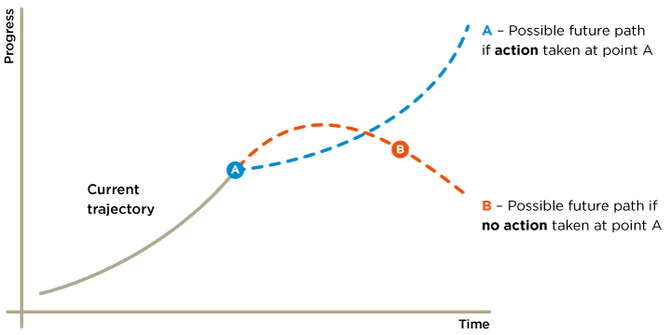|
One of the things I love about living in Kentucky is how distinct every season is. And as a bonus, sometimes we can get all four in a week! But each season has its own feel, its own qualities, and its own challenges. Leaders travel through different seasons in their journey--each has its own qualities and responses. And like the calendar, leadership seasons are cyclical. Here's my best shot at how the seasons flow.  The Honeymoon season of leadership is where a new leader enters the scene and everything is exciting, new, fresh, and optimistic. If you come into a dire situation, you are viewed as a source of hope. If you come into a healthy situation, you are viewed as the successor to continue pressing on. In ministry, this is the equivalent of the "Freshman 15" for college students. Be ready for a lot of casseroles, baked goods, and people wanting to have lunch with you. The emphasis in this stage should be adjusting your family, developing relationships, and spending time talking and listening to folks. The Pushback season of leadership is when the honeymoon ends. You had this too in your marriage. This was that first fight after settling into your apartment. Our first pushback was over how to sort laundry. Sounds silly, but your first argument with your spouse probably was too. In leadership, pushback happens when you make a change or when they find out you're not Superman. It's not wrong or bad, it's reality. None of us can ever live up to the expectations or imagination of what people think a leader should be. Or pushback can come when a leader feels impressed to make a change of something that has "always been done this way." It's important for a leader to remember to that any change initiative should be done slowly, with others on board, and with careful calculation of the cost and impact on your strategy. Changing something because you don't like it is dumb. Changing something because it doesn't advance the mission or connect people to Jesus is worth exploring. But no matter how small or insignificant you think something is, it likely means something to someone. So be ready for the pushback season. How you handle this is important. Will you listen to people or will you surround yourself with yes men? Will you communicate clearly your heart and intent? Will you build a coalition of other leaders or will you go out on the ledge with a chainsaw alone? The hopeful next season after pushback is what I'll call "Values, Vision, and Purpose." This is the season where who you are starts to shape who the church is, and what's important starts to rise to the top. Maybe you've got a dream of what you want things to look like down the road? When you share that and craft that, and ultimately write it down, you're capturing a vision. When you write down your values, you're laying out what's most important to you as a church, and what you will shape your priorities, budget, programming, and emphases around. And when you lay out purpose, you are laying out why and for whom you're working. These are huge, because now you're in the season of creating new norms, of cultivating a culture, and beginning the process of transformation. Like working outside during August, this season is hard work. It requires a leader to be proactive, to be relational, and to keep the endgame in mind. It's a huge task, but effective leaders are able to wear multiple hats. The next season is Mission. This is where things click, where what's been laid out as important is now put into practice. Maybe one of your values is building strong families. At the mission season, you're developing effective next generation ministries, hosting marriage seminars, and preaching regularly on the importance of the home and family for faith formation. If you're into Tuckman's Group Stages, this is similar to the "Performing" stage. Because you've laid out a vision of where things could be, you've given people a goal to chase. Because values have been normed, there's focus on what's important. And since you've laid out purpose, people are willing to serve and take on new projects and ministries because they see the One they're serving. The last season in the cycle is Transitions. Every church is both organization and organism. People come and go, jobs will take key leaders away, funerals will mark the end of a faithful legacy of people you counted on, and new people will be moving from attender to member to minister. Along with that, healthy organizations occasionally need to go through a process of evaluation and modification. Maybe there's a ministry that once was effective but has gone past its time, or a staff member gets a shift in their job description to match a new sense of calling. These things are normal, healthy, and good. But they require transitions. A transition is different than a change. In a change, things get shuffled and flipped. But in a transition, there's an intentional effort to honor what's been done, identify who can step into the gap, and turn the page to a new chapter. So cheer on the deacon who took a new job across the country, cry with their family, and let them finish well. Then, fill the gap with another qualified leader. Because the Transition season marks a whole shift in the leader's emphasis, we renew the cycle. So after a leader goes through Transitions, they'll go through Pushback as new leaders and new processes start to take shape which are different than what had been done before. And from there it moves to the Values, Vision and Purpose, then to Mission, and again back to Transitions. What's also worth mentioning is that like Kentucky where the seasons change daily sometimes, there is some fluidity in the Pushback, Values Vision & Purpose, and Mission seasons. Sometimes you'll float back and forth between those, and that's where a leader's flexibility and adaptivity is important (for more on this, check out Situational Leadership). The season that hasn't been mentioned is the Departure season. In this, a leader is the one making the transition. But it takes a tangent off the cycle because it impacts things much differently. And in the Departure season, the church takes the initiative to make sure that the leader is able to leave well and move off the cycle. In my book Dream Teams, I talk about the importance of leaving well. It's important for a leader to make sure they are setting up the church to continue on without them, and for the church to make sure the hard work and legacy of the leader is celebrated (but not idolized). Because a Departure season naturally means a significant transition, I took it off the cycle, it's inevitable that a Departure season is going to be a "lame duck" in a lot of ways. It's hard to get behind new initiatives because the next leader will bring a different set of ideas, gifts, and personality.
12 Comments
 A few months ago I met with my student leadership team where we talked about one of the most important words a leader can learn: no. They were shocked when I told them "I say no to anywhere between 80%-90% of the ideas people give me. It's not that they're always bad ideas, sometimes they are, but it's because I don't want to stuff our ministry with things that don't advance the goal." Every leader needs to learn to say no, but I think it's especially important for student ministers. We consume ourselves with the false impression that busy = effective, so we program ourselves to death chasing after every event, mission trip, concert, and retreat. The reality is that in the end, we're exhausting ourselves, straining our church resources, placing an extra burden on our families, asking parents to over-extended their finances, and often spending way too much time doing stuff that doesn't matter. You're not Superman. Most student ministries are small and often find the student minister (and spouse) as the main volunteers. When we say yes to everything, we put ourselves and our spouses on a pace that we weren't meant to keep. One person can't manage all that's often asked of student ministers. That's why it's so important to develop a team of volunteers, and empower them to lead ministries. Here's the reality guys, you're not that important. Some things can happen without you. You don't have to be at every ball game, every class fellowship, every birthday party, etc. Empower and equip your volunteers and cheer for them when they do those things. It multiplies your ministry and allows you to focus on the priorities God has for you in ministry. You can't let everyone be a guest speaker. "God's given me a message to share with your students" is a phrase that sends a chill up my spine. I'm not saying every guest speaker is wacky, but there are plenty out there. And as the primary teacher/communicator, you have the responsibility to make sure that what's being taught and presented is biblical and edifying. You can't let anyone and everyone have your teaching spot. I use a rotation of a handful of guys I know and trust when I have to be away from our regular student ministry gatherings. I typically go over the plan with them and get feedback on what they're planning to do, but since there's a high level of trust it's never an issue. It's not always so rosy though, two of the better examples I've had to say no to are:
You can't do every activity that gets suggested. One thing we can never do in student ministry is let things get stale, where we keep doing the same things over and over again. Everything has a shelf life, and even good ideas can become golden calves if we're not careful. Soliciting ideas from others is a great way to generate new ministries and activities. But just because it's a good idea doesn't mean that it's something to incorporate into your ministry. Ask yourself four questions:
In the end, that's ok. You're not called to be everything. If you're serving in a small church with a small student ministry, you can't do all the things the megachurch across town can do. That's ok. Focus on the students God has given you and invest your life in them. And if you're in the megachurch, your time will be spent investing in leaders and volunteers more than in students. That's ok. Empower them to multiply the ministry. The point of this article is simple: be who God has called you to be, and do what God has called you to do. Learning to say no helps you keep your eyes on what's most important.  "If it ain't broke, don't fix it" If you've not heard those words, you've probably said them. I'd be willing to bet that many of you reading this are shrugging your shoulders and wondering what the big deal is. Over the last few years, I've become increasingly convinced that not only should leaders avoid using these words, but that they can actually become a slow death for a leader or a ministry when this becomes engrained. Just because it's not broke doesn't mean it's working or effective - A lot of ministries and activities happen in a church that aren't broken. They happen regularly with a committed group of volunteers, receive annual budget funds, and are mainstays on a church calendar. But they may not be working or effective. They may take necessary funds from other ministries higher on the priority list, they may no longer reach the targeted demographic, they may not have the impact on the church or community they once had. But on the surface, they don't appear broken. "Don't fix it" kills innovative thinking - One of the things I read this summer was about Tom Brady, who had just won his fourth Super Bowl. In the offseason, he's known as a grinder in the weight room, constantly watching film and working on his throwing mechanics. In history he may be regarded as the greatest NFL quarterback of all time--the definition of "not broken." But he's always looking to innovate, to improve, to sharpen and to refine. Adopting a "don't fix it" mentality stifles the creative and evaluative processes that drive a ministry's constant improvement. One thing every ministry leader should do on a regular basis is ask "What could we change to do things better and be more effective?" In those brainstorming and evaluation sessions, very little needs to be considered "untouched." My three untouchables are weekly Bible study, regular missions involvement, and intentional small groups. Beyond that, anything and everything is fair game. It may not be broke, but it may be sick - In a lot of ways, this goes back to the first point. Leaders who assume that not-broke is healthy are failing to look beyond the initial assessment. Carefully looking at what a ministry does and asking the bigger questions "why? and what for?" help determine if something is in fact healthy. Many activities flow on a plan where the initial push leads to growth and efficiency, which then plateaus before beginning a descent (see sigmoid chart below). A lot of times we find ourselves on the plateau or on the slow descent and don't recognize where we are because, on the surface, things look good. But deep down, there is sickness that needs to be addressed.  Taking this position is the easy fix - One of the biggest takeaways from my doctoral work on leadership development was that in many cases, leaders took the easy way out. Leading significant growth, change, and culture processes requires a huge investment of time and energy. But the fruit from that is both exponential and multigenerational. However, it's easier to do just easy to keep it in maintenance mode. That became obvious when learning to drive, that the majority of the work a driver does it keep the car straight by maintaining course. It's only when there is an urgent need for change that the driver does what's necessary to steer dramatically. This view limits a leader's effective reach - When I worked at Starbucks in college and grad school, we had several times where we as a company would relaunch products or promotions. And then once we had a complete overhaul. Every store in the country closed to re-train employees and cast a new vision. The reason? Our CEO began asking questions and abandoned the "if it ain't broke" approach. The company was making money by the truck load and stores were expanding, but the growth wasn't sustainable and it wasn't in line with the company values. So instead of looking and doing nothing, Howard reached into the very heart of the company and led from the front lines, where his reach was felt throughout the company. As our product lineup was refined and we were able to return to the core values, the impact was felt by customers who had fallen in love with the "Third Place" experience. What else would you say about this phrase? How have you seen it impact a ministry?  Check out this ad from 1991 for Radio Shack (yes kids, that's where we went to get gadgets in the Dark Ages). Look at how everything in how we communicate, play, and share electronically has changed. What was once cutting edge is now on display in museums. One thing we cannot escape is that the way we do ministry is going to change. Twenty years ago in student ministry it was fueled by caffeine overnight trips, Red Rover, Chubby Bunny, and lock-ins. The way we connect with and invest in students has changed because times have changed, we've become more aware of the importance of safety, and we've recognized that lasting fruit happens when it's intentionally pursued. Making any change in student ministry needs to be something carefully thought out. I'm indebted to John Kotter from Harvard Business School for his work on leading change. His Eight Steps have proven invaluable to me over the years, and have formed the basis for how I lead change processes in student ministry. I've adapted some of his list, but here are some ways to go about leading change in your student ministry.  Have a "Dream Picture" - Kotter calls this a "strategic vision," which I've amended slightly. In the Dream Picture, you start with the end game at graduation by asking 3 questions: What do we want our students to know? What do we want them to love? What do we want them to do? These three questions help define what would be the Dream, an ideal student who graduates from our student ministry. Knowledge involves the forming of a biblical worldview, Love involves a growing and deepening faith, and Do involves missions and service within and outside the church. Build a Team - I'm intentional about who I bring in to help serve in our student ministry, because I want people who are team players, committed to serving, faithful in their church involvement, and who want to see great things happen. It's important to bring these people in to the Dream Picture and help them construct it. I often ask parents, grandparents, and young couples to serve in our student ministry so that we get a variety of perspectives. Also I think it's important to include in that team students who have proven themselves and have the maturity to get the big picture. Identify Roadblocks - When I first got to Westside, I made it very clear that we were going to make things intentional and we were going to have a plan. And that might include removing some things that didn't fit the plan. With your Team, work to identify any roadblocks in your ministry strategy, calendar, or philosophy that don't help you achieve the Dream Picture. It doesn't mean you make any change yet, it just means you've identified some areas to work through. Communicate Clearly with Parents - One of the biggest regrets I've had is that I wasn't more intentional about communicating change processes to parents. But they are the stakeholders in your ministry, not your students. They are the ones who trust you with their students. So anytime you make any change, you need to be clear in your communication. You also need to make sure that communication is two-way. Just giving information won't help win the change process, they need the opportunity to ask questions and give feedback. Sometimes they'll stop you from stepping on land mines! Be Ready for Pushback - Some of the things that you and your Team will identify as Roadblocks to the Dream Picture may be things your students love and are attached to. To prepare for this, you need to make sure you have talking points for your Team, trusted students you can enlist to help communicate, and some thick skin for any criticism you might get. Replace Losses with Gains - Whenever you remove a roadblock, it's going to be a loss for someone. The change process can go smoother when you are able to build in some wins/gains for students. One thing I said early on was no lock-ins, which is met with resistance every time I answer the question with the same answer. In order to replace that perceived loss, we build in late-night activities and I've asked those most resistant to removing lock-ins to help in the decision-making process. Work Slowly unless it's an Emergency - Leading any change process can be costly if it's done too quickly. Student ministry is no exception. I've followed a "1 Year" rule, that no roadblock will be removed for at least a year. This enables a new crop of students to come up who aren't emotionally attached, a chance for those who are to graduate, and a chance to work with the Team to develop the process and strategy. The exception is when it's a big deal that needs to be dealt with quickly. I've only done this twice. The first was create a process of financial management because our snack bar was unchecked. The second was to remove from our student ministry library the NOOMA videos by Rob Bell because of some heretical views he had taken towards salvation. Enlist your senior pastor and children's minister - The two biggest allies for a student minister are the lead pastor and the children's minister. One is your mouthpiece to the entire church, the other is your feeder for your ministry. Any significant change process you do needs to be something they are both aware of and on board with. It's good to have your lead pastor in the discussion because you want to make sure your ministry strategy and philosophy is lining up with his direction for the church, and so your children's minister can help you lead the transition to student ministry. Cheer for Change - One major change I did recently was move our camp, from one 4 hours away to one 30 minutes away. Every chance I got I took time to hype up what the new camp had to offer, how much bigger it was, and how many more friendships our students could make. I also took time to talk to a number of parents about it who quickly became cheerleaders for it. And the message was always communicated in a way that reinforced how this change was for the best and how it helped us achieve our Dream Picture. What ways have you worked to make change in your student ministry that you'd like to share? The other night I got to have a great conversation with a student who is passionate about her faith, broken over what she sees at her school and how people are content to live without Christ, and frustrated at a student organization. While she was sharing about what all is going on, one thing turned our conversation, when she said "I'm just so frustrated I think I'll leave and next year when they need leadership I'll jump in and take over." I have absolutely no doubt that when she becomes a leader, she'll make things happen, but my counsel to her was to wait and stay and try to change things from within.
We've probably all been there, where we've been in a job or organization or club and things were so frustrating that we wondered if the best thing to do would be to walk away. And that's a perfectly fine option for most people, if something isn't going the way you thought it would or what you had expected, sometimes the best answer is to walk away. But not if you want to see things changed. That's where you have to stay and work for change from within. The best change catalysts come from those who have been there, invested the time and energy, and been willing to be patient for when their time comes. First, check your motives. Are you interested in making change to an organization because it doesn't match your preferences, or are you interested in making change because you want to see the organization transform into something healthy and effective? Here's the thing, leaders don't get their preferences. Leaders don't get to make things comfortable for themselves. Leaders have to be willing to sacrifice their preferences and their unique taste for the sake of the group. On the other hand, if you're more concerned with health and effectiveness, and you're willing to put your own comfort aside, great things can happen. Second, learn everything you can. Each organization, whether it's brand new or older than dirt, has a history and culture. Those are summed up in what the organization values, does, and who they attract. Find out why the organization was started, get to know the people who are involved in it, discover what they love and value. If an organization has plateaued and is just in "maintenance mode," chances are someone is there who remembers when things were functioning. Lean on them and find out what the vision was. Third, be a servant. God's design for leadership is different than the World. In God's design, leadership authority is the direct result of humility and service. Leaders who want to be God's change agent cannot assume they can walk in and take over. Leadership comes through serving others, being humble, and making yourself available to do whatever jobs are necessary. One of the best lessons on leadership came from my mentor in college and grad school, who had a requirement for anyone who wanted to be a public, visible leader: they had to be willing to arrive early and set up chairs. It was a test for those who truly wanted to be a servant leader or who just wanted to be the center of attention. Fourth, have a plan. When Nehemiah was brought into the King's presence with a plea to rebuild Jerusalem, he didn't make it up as he went. He went in with a specific plan. If you want to be a change agent, you need to set the course. You can't travel somewhere without having a map with a plan (or a GPS). So if you want to be a catalyst for change, know exactly what you want to do different and how you'll do it. Fifth, build a team mindset. Making needed changes and building something special means gathering a team around you. Teams are built around a common vision and purpose, which is communicated and developed by you as the leader. When you're building a team, you're looking for people who can carry out what you'd like to see happen based on their gifts and abilities. One thing I did when I was looking to transform our student ministry was surround myself with people I could trust and who would be faithful. Those were two values I treasured. From there we could communicate what we were hoping to accomplish and I knew I could count on them to make it happen. Leading change is never easy, it is often a difficult and rocky road. But if it's for the right motives with the right intentions and the right attitude, it can be a really special thing. The great thing about being the catalyst is that even after you've moved on or graduated, the transformation is still happening. So rather than making surface or superficial things the most important thing, let's aim higher for transformation. |
Scott M. DouglasA blog about leadership and the lasting legacy of family ministry. Archives
August 2023
Categories
All
|


 RSS Feed
RSS Feed



